- Page 1 and 2:
FIFTH BIENNIAL REPORT OP THE NORTH
- Page 4 and 5:
ki ^5-t.
- Page 7 and 8:
FIFTH BIENNIAL REPORT t OF THE NORT
- Page 9 and 10:
LIST OF COUNTY SUPERINTENDENTS OF H
- Page 11 and 12:
LIST OF SUPERINTENDENTS OF HEALTH.
- Page 13 and 14:
— FIFTH BIE:NNIAL REPORT OP THE N
- Page 15 and 16:
: MEETINGS OF THE BOARD. MINUTES OF
- Page 17 and 18:
: FIFTH BIENNIAL REPOHT. 11 ACTION
- Page 19 and 20:
FIFTH BIENNIAL REPORT. 13 On motion
- Page 21 and 22:
FIFTH 15IEXNIAL REPORT. 15 ment fro
- Page 23 and 24:
PROCEEDINGS CONJOINT SESSIONS OF TH
- Page 25 and 26:
FIFTH BIENNIAL KEPOKT. 1 H* it of h
- Page 27 and 28:
FIFTH BIENNIAL REPORT. 21 delinqiio
- Page 29 and 30:
FIFTH BIENNIAL KEPOKT. 23 The Conte
- Page 31 and 32:
FIFTH BIENNIAL REPORT. 25 amend it
- Page 33 and 34:
FIFTH BIENNIAL REPORT. 27 Sec. 5. T
- Page 35 and 36:
FIFTH BIENNIAL REPORT. 29 day of de
- Page 37 and 38:
FIFTH BIEXXIAL REPORT. 31 the schoo
- Page 39 and 40:
FIFTH BIENNIAL RKPOKT. Soto water .
- Page 41 and 42:
FIFTH BIKXXIAF. KK1N)1;T. '.\~) ami
- Page 43 and 44:
FIFTH r.IKNXIAL REPORT. 37 Raleigh,
- Page 45 and 46:
, FIFTH BIENNIAL KEPORT. o9 To this
- Page 47 and 48:
FIFTH BIENNIAL REPORT. 41 such room
- Page 49 and 50:
FIFTH BIENNIAL REPORT. 43 cheap mat
- Page 51 and 52:
FIFTH BIKNNIAL KEPORT. 45- mailed s
- Page 53 and 54:
FIFTH lilKNXIAL KEPOET. 47 To till'
- Page 55 and 56:
FIFTH lilKXXIAL KKPORT. 49 Raleigh,
- Page 57 and 58:
FIFTH niKXXIAr. i;Er(*RT. ol Board.
- Page 59 and 60:
FIFTH i'.TKXXIAL REPORT. 53 least o
- Page 61 and 62:
FIFTH BIENNIAL REPORT. 55 ance of s
- Page 63 and 64:
L'lFTH BIENNIAL REPORT. 57 nj so O
- Page 65 and 66:
FIFTH BIENNIAL REPORT. 59 Form No.
- Page 67 and 68:
FIFTH BIENNIAL REPORT. 61 known to
- Page 69 and 70:
FIFTH lUKXXIAL REPORT. 03 ANNUAL RE
- Page 71 and 72:
FIFTH BIENNIAL REPOIIT. 65 Dr. Rich
- Page 73 and 74:
FIFTH BIENNIAJ. REPOitT. 67 water w
- Page 75 and 76:
FIFTH BIENNIAL REPORT. 69 respectiv
- Page 77 and 78:
FIFTH r.IKNXIAL KKPOKT. 71 explaine
- Page 79 and 80:
: FIFTH BIENNIAL REPORT. 73 protect
- Page 81 and 82:
FIFTH BIENNIAL REPORT. 7o special i
- Page 83 and 84:
FIFTH lUFXNIAL KKPORT. 77 amount of
- Page 85 and 86:
FIFTH BIENNIAL REPOET. 79 1. If the
- Page 87 and 88:
FIFTH BIENNIAL REPORT. HI SMALL-POX
- Page 89 and 90:
FIFTH BIENNIAL REPORT. 83 little pe
- Page 91 and 92:
FIFTH BIENNIAL REPORT. 85 the same
- Page 93 and 94:
. FIFTH niEXXIAI. ItEl'OKT. 87 as s
- Page 95 and 96:
t'lFTlI BIENNIAL KEPORT. 89 an hour
- Page 97 and 98:
FIFTH BIENNIAL KFrORT. 91 not SO pr
- Page 99 and 100:
FIFTH BIENNIAL REPORT. 93 negroes.
- Page 101 and 102:
— — FIFTH BIENNIAL REPORT. 95 T
- Page 103 and 104:
— FIFTH BIENNIAL REPORT. 97 TABLE
- Page 105 and 106:
FIFTH BIENNIAL REPORT. 99 1 1 CO Oi
- Page 107 and 108:
FIFTH BIENNIAL REPORT. 101 mo J,
- Page 109 and 110:
FIFTH BIENNIAL REPORT. 103 is s o O
- Page 111 and 112:
' I * I 1 CO O CS ^1 '^ I—( . I ^
- Page 113 and 114:
FIFTH BIEXXIAL REPORT. 107
- Page 115 and 116:
FIFTH BIENNIAL REPORT. 109
- Page 117 and 118:
FIFTH BIENNIAL RFPORT. Ill effect o
- Page 119 and 120:
FIFTH BIENNIAL REPORT. 113 a few ye
- Page 121 and 122:
FIFTir BIENNIAL REPORT. 115 takeu c
- Page 123 and 124:
FIFTH BIEXNIAL REFOKT. 117 deep pip
- Page 125 and 126:
FIFTH BIENNIAL REPORT. 119 su[)})ly
- Page 127 and 128:
FIFTH BIENNIAL REPORT. 121 tliat re
- Page 129 and 130:
FIFTH BIENNIAL REPORT. 123 means of
- Page 131 and 132:
FIFTH DIKXNIAL REPORT. 125 use. A s
- Page 133 and 134:
FIFTH BIENNIAL KKPOKT. 127 STATESVI
- Page 135 and 136:
FIB^TH BIEXMAL REPORT. 129 WILSON.
- Page 137 and 138:
FIFTH BIENNIAL REPORT. 131 of sui)p
- Page 139 and 140:
I'lFTlI r.lEXXIAL REPORT. 138 desir
- Page 141 and 142:
1"11'TII lUKXNIAL REPORT. 135 State
- Page 143 and 144:
; FIFTH ElKNNIAl. REPORT. 137 can b
- Page 145 and 146:
FIFTH BIENNIAL KEPOKT. 139 l)ly in
- Page 147 and 148:
FIFTH niFXXIAL REPORT. 141 The foll
- Page 149 and 150:
FIFTH BIENNIAL REPORT. 143 TYPHOID
- Page 151 and 152:
FIFTH BIENNIAL REPORT. 145 neverthe
- Page 153 and 154:
FIFTH BIENNIAL r.Iil'OKT. 147 of th
- Page 155 and 156:
FIFTH BIENNIAL REPORT. 149 childhoo
- Page 157 and 158:
FIFTH BIENNIAL REPORT. 151 conseque
- Page 159 and 160:
FIFTH BIENNIAL REPORT. 1 0.3 hygien
- Page 161 and 162:
FIFTH PilENNIAI, REPORT. 155 "Resol
- Page 163 and 164:
20 FIFTH BIENNIAL REPORT. 1 oT EEPO
- Page 165 and 166:
I FIFTH i'.IKNXIAI. REPORT. lof) o
- Page 167 and 168:
FIFTH BIENNIAL REPORT. 161 Julv 14.
- Page 169:
FIFTH BIENNIAL KPJPORT. 163 Dec. 2!
- Page 172 and 173:
1
- Page 174 and 175:
168 APPENDIX. In addition there wil
- Page 176 and 177:
170 APPENDIX. proximity of a large
- Page 178 and 179:
172 APPENDIX. only for the good of
- Page 180 and 181:
174 Al'l'KXDlX. is the least doubt
- Page 182 and 183:
176 APPENDIX. products from its lym
- Page 184 and 185:
178 APPENDIX. mated as soon as poss
- Page 186 and 187:
180 APPENDIX. take one-sixtieth of
- Page 188 and 189:
182 AIM'KNDIX. ])]. Murdocli: ''I w
- Page 190 and 191:
18-4: Ari'Exnix. of the duties whic
- Page 192 and 193:
186 , Ai'i'Kxr)ix. cians and niirse
- Page 194 and 195:
188 APPENDIX. for the disinfection
- Page 196 and 197: 190 APl'ENDIX. disease and fearful
- Page 198 and 199: 192 APPENDIX. gates, and sacrifices
- Page 200 and 201: 194 APPENDIX. flannel that had been
- Page 202 and 203: 196 ATPEXDIX. began dying of typhoi
- Page 204 and 205: 1^8 APPENDIX. present in the easter
- Page 206 and 207: 200 APPEXDIX. to quote, in j^art, h
- Page 208 and 209: : : 202 APPENDIX. Rememl)ering how
- Page 210 and 211: 204 APPENDIX. I could quote one fam
- Page 212 and 213: 20G APFENDIX. "As another instance
- Page 214 and 215: 208 APPENDIX. for our ills. 1 had a
- Page 216 and 217: 210 APPENDIX. Hon. W. D. Pruden, Ed
- Page 218 and 219: 212 APPENDIX. year, and but little
- Page 220 and 221: 214 APPENDIX. too strongly—throug
- Page 222 and 223: 216 APPENDIX. will not have it read
- Page 224 and 225: 21
- Page 226 and 227: 220 APPENDIX. the quality of the su
- Page 228 and 229: 222 APPENDIX. AUOKISMUM. SUGGESTION
- Page 231 and 232: APPENDIX. 223 if the filter has pro
- Page 233 and 234: APPENDIX. 225 than if it was freshl
- Page 235 and 236: APPENDIX. 227 soap required by a ha
- Page 237 and 238: APPENDIX. 229 the Massachusetts Sta
- Page 239 and 240: APPENDIX. 231 subject is so importa
- Page 241 and 242: APPENDIX. 23 •> fever. On the 251
- Page 243 and 244: APPENDIX. 235 Dr. Thomas: '"I hope
- Page 245: APPEXDIX. 237 theory ; I will atten



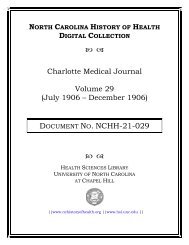
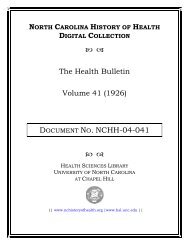
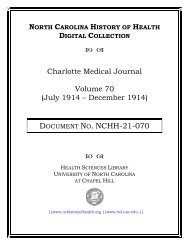
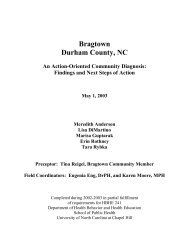
![Bulletin of the North Carolina Board of Health [serial] - University of ...](https://img.yumpu.com/48032016/1/153x260/bulletin-of-the-north-carolina-board-of-health-serial-university-of-.jpg?quality=85)
![The Health bulletin [serial] - University of North Carolina at Chapel Hill](https://img.yumpu.com/47603625/1/169x260/the-health-bulletin-serial-university-of-north-carolina-at-chapel-hill.jpg?quality=85)
![The Health bulletin [serial] - University of North Carolina at Chapel Hill](https://img.yumpu.com/47242858/1/169x260/the-health-bulletin-serial-university-of-north-carolina-at-chapel-hill.jpg?quality=85)
![The Health bulletin [serial] - University of North Carolina at Chapel Hill](https://img.yumpu.com/43204263/1/172x260/the-health-bulletin-serial-university-of-north-carolina-at-chapel-hill.jpg?quality=85)
![The Health bulletin [serial] - University of North Carolina at Chapel Hill](https://img.yumpu.com/41981074/1/163x260/the-health-bulletin-serial-university-of-north-carolina-at-chapel-hill.jpg?quality=85)
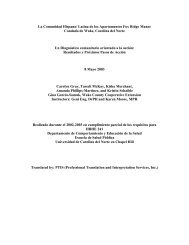
![The Health bulletin [serial] - University of North Carolina at Chapel Hill](https://img.yumpu.com/40912928/1/164x260/the-health-bulletin-serial-university-of-north-carolina-at-chapel-hill.jpg?quality=85)
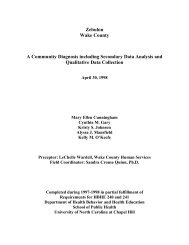
![The Health bulletin [serial] - University of North Carolina at Chapel Hill](https://img.yumpu.com/35643061/1/167x260/the-health-bulletin-serial-university-of-north-carolina-at-chapel-hill.jpg?quality=85)
![Biennial report of the North Carolina State Board of Health [serial]](https://img.yumpu.com/34024350/1/166x260/biennial-report-of-the-north-carolina-state-board-of-health-serial.jpg?quality=85)
